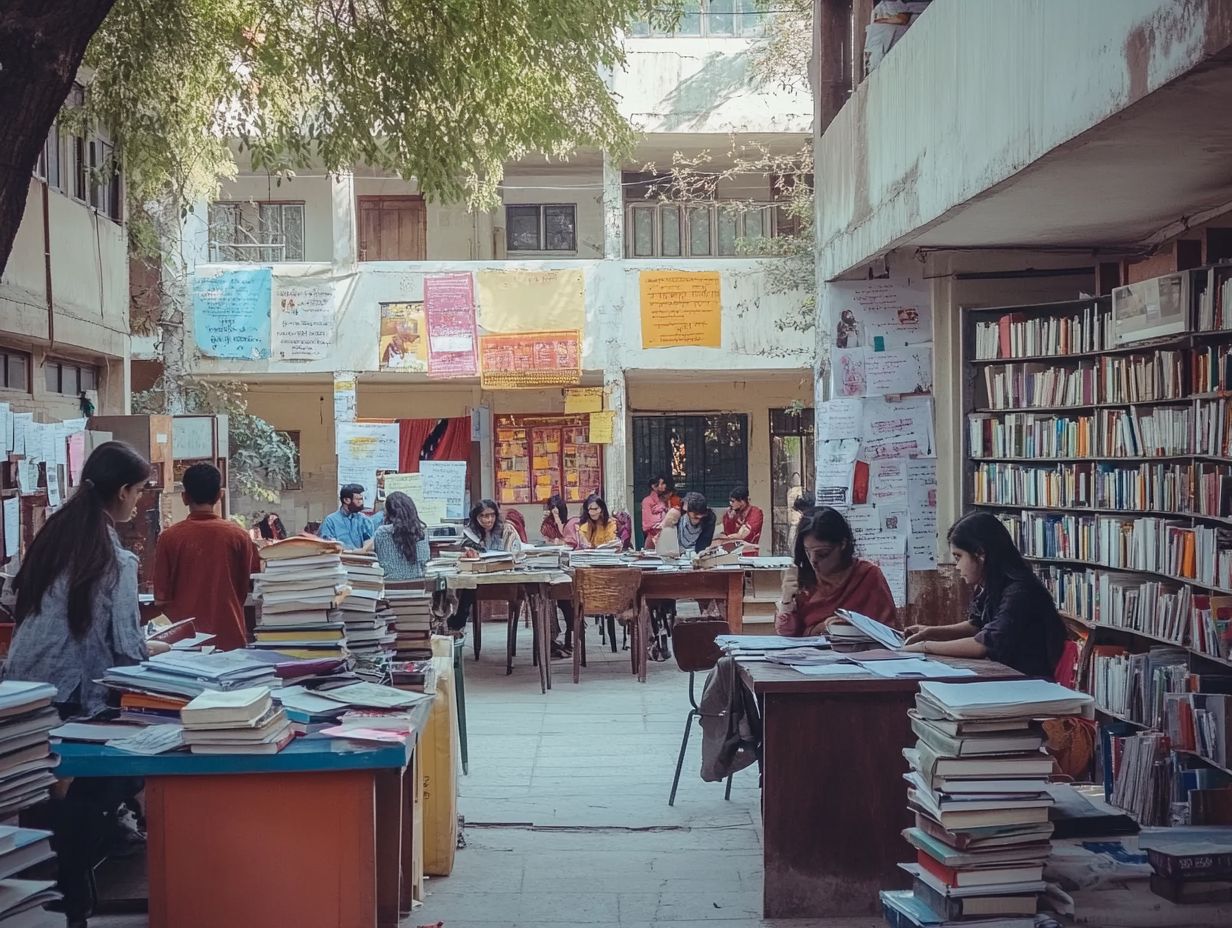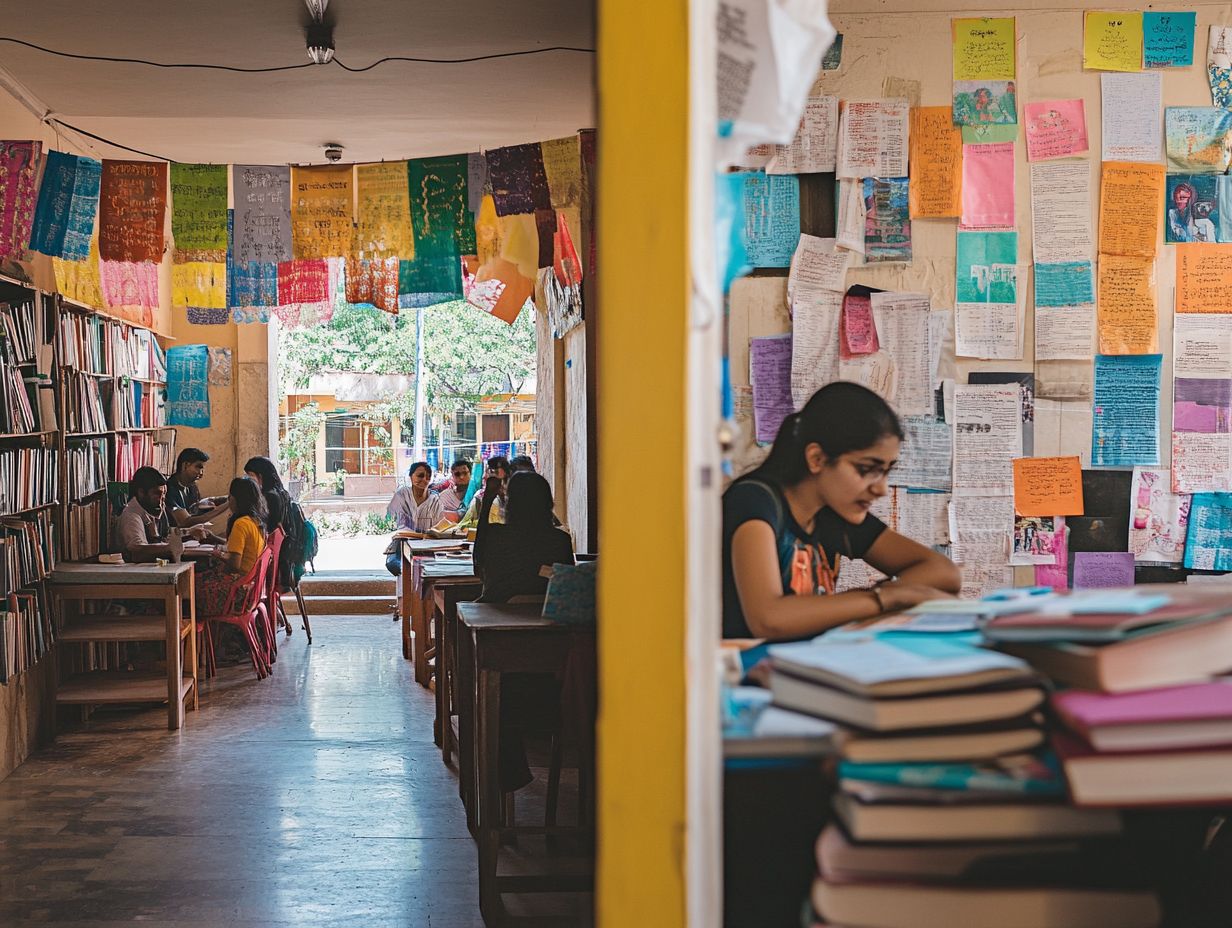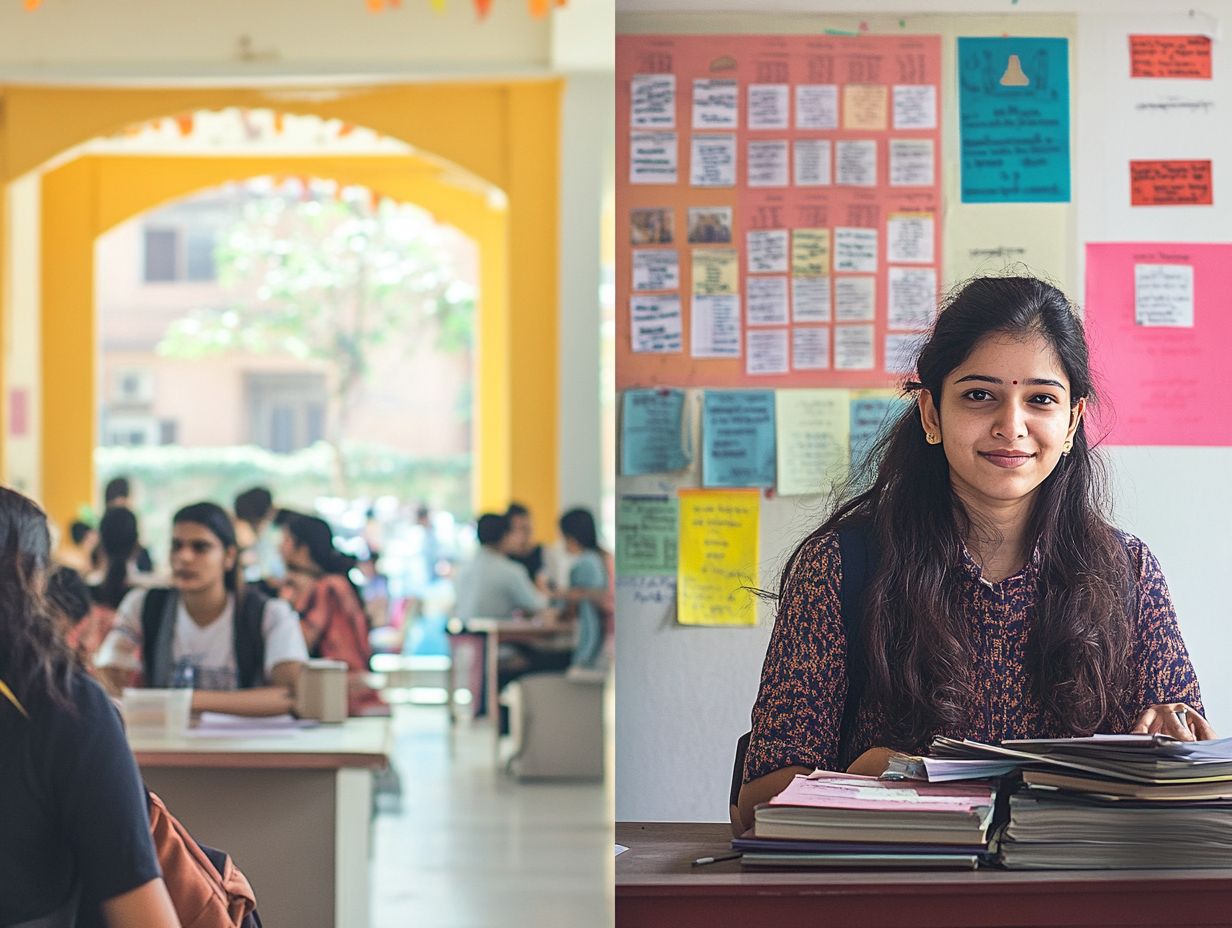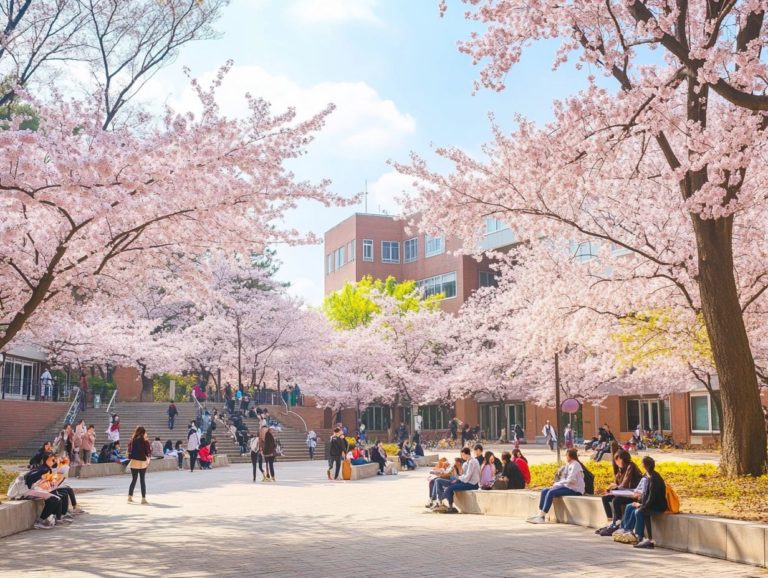The Pros and Cons of Studying in India
Studying in India presents a variety of experiences, seamlessly blending affordability with cultural diversity. As you weigh your options, grasping the benefits and challenges of this distinctive educational landscape becomes essential.
From vibrant opportunities for cultural immersion to challenges related to infrastructure and quality, this exploration delves into both sides of the equation. You’ll discover practical tips designed to help you adapt and flourish, ensuring your academic journey in India is not only successful but also unforgettable.
Contents
- Key Takeaways:
- Pros of Studying in India
- Cons of Studying in India
- Tips for Making the Most of Studying in India
- Frequently Asked Questions
- Why study in India? Here are some great reasons!
- What are the drawbacks of studying in India?
- How does the cost of studying in India compare to other countries?
- What are the top universities in India?
- Is studying in India common for international students?
- Are there scholarships available for international students in India?
Key Takeaways:

- Studying in India offers a diverse and affordable education system, providing opportunities for cultural immersion and personal growth.
- However, challenges with infrastructure and quality, as well as navigating cultural differences, can be potential drawbacks for international students.
- To make the most of studying in India, it is important to adapt to the environment and build a strong support network for academic and personal success.
Overview of the Education System
The education system in India is a fascinating combination of traditional and modern teaching methods, offering an array of academic programs tailored to your personal goals and career aspirations. It encompasses primary, secondary, and higher education levels, supported by institutions that meet international standards.
As you navigate your educational journey, you ll encounter a variety of options that broaden your global perspective, providing valuable cultural exposure while addressing financial constraints through scholarships and affordable pathways.
At the primary level, you’ll focus on building foundational skills in literacy and numeracy, setting the stage for a strong secondary education that introduces specialized subjects. The higher education landscape in India is vast, featuring a range of institutions from prestigious universities to vocational training centers, catering to diverse fields such as engineering, medicine, and the arts.
This variety enriches your academic experience and promotes a holistic approach to education, which means focusing on all aspects of a student’s development academic, emotional, and social. With an increasing emphasis on quality assurance and global partnerships, Indian educational programs are gaining credibility, making them appealing to both local and international students who seek a rich and diverse learning environment.
Pros of Studying in India
Studying in India offers a wealth of advantages, particularly its affordability and the rich cultural exposure that can greatly enhance your personal growth and global perspective.
With a variety of scholarships available, you can effectively navigate financial constraints, ensuring not only access to quality education but also the chance to immerse yourself in the unique cultural tapestry that India presents.
This diverse educational landscape broadens your academic opportunities and equips you with the skills needed to thrive in a competitive job market.
Affordability and Diversity
Affordability is a significant draw when considering studies in India, whether you’re a domestic or international student. The country offers a wide array of educational programs at a fraction of the cost you’d find in many Western institutions. With numerous scholarships available, you can ease financial burdens and pursue a high-quality education that aligns with your personal goals.
You will find a diverse Indian education system, covering fields from engineering and medicine to the arts and humanities, ensuring you can discover programs that truly resonate with your interests and career aspirations. Many universities offer merit-based scholarships, need-based assistance, and special provisions for underprivileged communities, playing a crucial role in making quality education accessible.
Initiatives like the Post-Matric Scholarship Scheme provide further support for students from economically weaker sections, giving you the power to concentrate on your studies and enhance your future prospects without the weight of financial stress.
Don’t miss out on the chance to immerse yourself in India’s vibrant culture!
Opportunities for Cultural Immersion

Studying in India opens up a world of unique chances for cultural immersion, allowing you to engage with a rich tapestry of traditions, languages, and lifestyles. This significantly enhances your personal growth and adaptability.
By networking with fellow students and local communities, you can develop a deeper understanding of the local culture that enriches your educational experience and broadens your global perspective.
Such experiences not only deepen your understanding of India s diverse heritage but also challenge your preconceived notions, helping you be more open-minded. As you explore this lively place, you will acquire invaluable skills like effective communication and empathy essential tools for your future career in an increasingly interconnected world.
Forming connections with local peers and professionals can lead to collaborations and insights that are pivotal in today s global job market. Engaging with a variety of viewpoints amplifies your ability to think critically and innovate, making cultural immersion a cornerstone of your academic journey.
Cons of Studying in India
While studying in India offers a wealth of benefits, it’s essential for prospective students to weigh the pros and cons of studying abroad as well, particularly concerning infrastructure and the overall quality of education.
- Some institutions may grapple with outdated facilities.
- Inconsistent teaching methods can significantly influence your learning experience.
- These factors can potentially affect your long-term goals.
Challenges with Infrastructure and Quality
One of the significant challenges you might encounter while studying in India is the inconsistent quality of education across various institutions. This inconsistency often stems from inadequate infrastructure and resources.
While many universities are committed to achieving international standards, others may struggle with outdated technology and facilities. This gap limits your access to crucial learning tools. It also impacts the academic atmosphere, making it difficult for you to fully engage with the curriculum.
Not enough libraries, poorly equipped laboratories, and a lack of digital resources can create gaps in practical learning and research opportunities. The resulting stress and frustration may take a toll on your mental well-being, ultimately affecting your overall performance.
Quality issues also stifle your academic success and tarnish the institution’s reputation, affecting the employability of its graduates and perpetuating a cycle of inequality within the educational landscape.
Navigating cultural differences can present emotional challenges for you as an international student in India. You might find yourself facing unfamiliar customs and social norms that can impact your personal growth and adjustment.
Building cultural familiarity is crucial for overcoming these challenges, enabling you to thrive in your new environment and fully benefit from your educational journey.
For many students, the stark contrast in everyday interactions and communication styles can lead to feelings of isolation or frustration. It s easy to feel overwhelmed trying to grasp local traditions and practices, yet it s often in these uncomfortable moments that significant personal development takes place.
Embracing adaptability allows you to forge meaningful connections with peers and professors, ultimately cultivating a sense of belonging. By approaching these obstacles with an open mind, you can turn your experiences into valuable lessons about resilience and intercultural understanding, enriching not only your academic pursuits but also your overall worldview.
Are you ready to embrace these challenges on your journey?
Tips for Making the Most of Studying in India

To truly maximize your studies in India, you can adopt several strategies that ease your transition into this vibrant new environment while helping you cultivate a robust support network. These techniques not only enrich your personal growth but also foster a positive educational experience, giving you the power to excel both academically and socially.
Adapting to the Environment
Adapting to the Indian environment is essential for you as an international student. It s all about overcoming cultural differences and embracing experiences that foster personal growth. By actively engaging with local communities and participating in cultural activities, you can enrich your educational journey and gain valuable insights into India s vibrant heritage.
This journey extends well beyond the classroom. It calls for an open mind to appreciate the diverse customs, festivals, and lifestyles that shape daily life in India. Getting involved in community volunteering is also beneficial. Joining student-led cultural groups offers you firsthand exposure to traditions and values that may significantly differ from your own. Learning local languages can act as a bridge to deeper connections, helping you build friendships and reduce feelings of isolation.
By navigating these challenges and fully embracing the experience, you won t just acclimatize; you ll emerge with a broader worldview and enhanced adaptability qualities that are invaluable in today s interconnected society.
Building a Support Network
Building a strong support network can transform your experience as a student in India. It provides the resources and connections necessary to handle challenges well. By fostering relationships with peers, faculty, and local communities, you can enrich your student life and enhance your personal development throughout your educational journey.
Establishing these vital connections can open doors to internships, mentorships, and collaborative projects that might otherwise remain out of reach. Networking helps you share ideas and experiences, fostering a sense of belonging which can lift your spirits during tough academic times.
Join clubs, attend seminars, and engage in community service to broaden your horizons. By leveraging social media platforms and local networking events, you can forge lasting relationships that are instrumental in both personal and professional growth, equipping you with the confidence to tackle future endeavors.
Frequently Asked Questions
Why study in India? Here are some great reasons!

Some potential benefits of studying in India include rich cultural experiences, affordable tuition fees, and opportunities to learn from top educators in various fields.
What are the drawbacks of studying in India?
Some potential drawbacks of studying in India include cultural differences, language barriers, bureaucratic processes for international students, and concerns about safety and healthcare.
How does the cost of studying in India compare to other countries?
The cost of studying in India is generally much lower than in other countries, with affordable tuition fees and a low cost of living. However, this can vary depending on the institution and location.
What are the top universities in India?
Some of the top universities in India include the Indian Institute of Technology, Jawaharlal Nehru University, and University of Delhi, among others.
Is studying in India common for international students?
Yes, India is a popular destination for international students, with thousands of students from various countries studying in India each year.
Are there scholarships available for international students in India?
Yes, there are various scholarships available for international students in India, including government-funded scholarships and those offered by universities and organizations.






